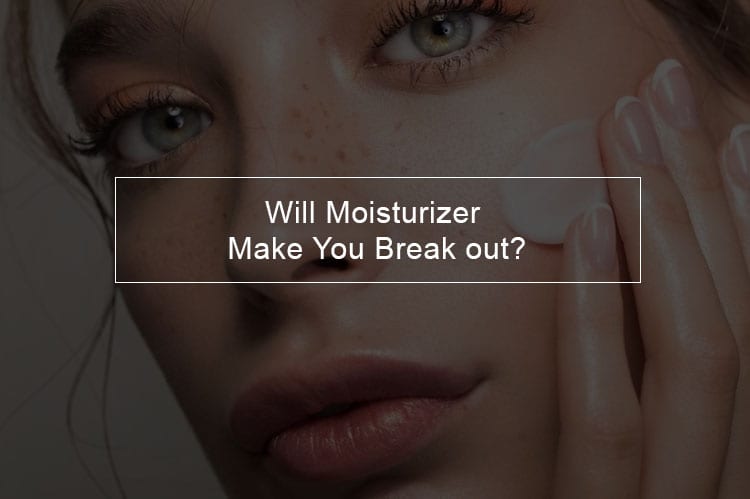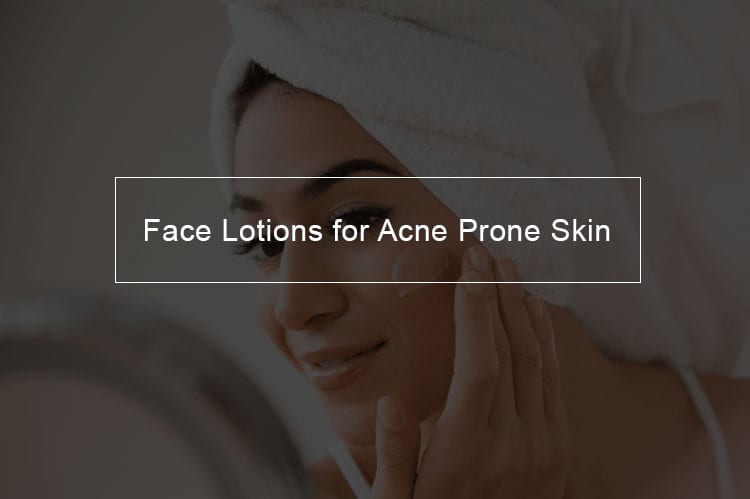
Will lotion worsen my acne condition? It is the question on most people's mind. And the answer is the human skin requires moisture. Even oily skin needs moisture. Acne medications are usually very drying, so you may expect more moisturizer when you are fighting breakouts. Otherwise, the over-dryness may cause inflammation, and then you’re back where you started: dealing with more acne. Just be sure to buy a product that’s non comedogenic. In case you're still uncertain, if the labeled is 'oil-free,' you’re good to go.
What Is a Lotion?
Components Of A Good Acne Lotion
A lotion is nothing more than a liquid product that is thin enough to be spread over the skin quickly and thick enough to stay on the skin surface for minutes or hours until it is washed off or dissolves in perspiration. Usually, lotions have tiny bubbles or no bubbles at all, and they are used to provide substances for the skin slightly remove dirt, grime, or oil off the surface. Most lotions contain both water and at least one ingredient that is not readily soluble in water. These additives can cause problems in some products.
A good acne lotion is one that delivers: : "A skin healing ingredient,In the right concentration, At the proper pH,In a liquid that stays on the skin long enough for the component to do its job."
Many lotions don't have the right component for a particular skin type. Or they might have the right ingredient in a concentration that is not strong enough to make a difference. Or they might be high-pH, alkaline formulas that don’t interact well with the skin. (Alkalizing is right inside the body, but mild acidifying is best for the skin.) Or the instructions with the product might say to wash it off after just a few minutes, soon enough to make sure no one writes in to complain about side effects, but not long enough to make a real difference for the skin. There are a few lotions that are just plain harmful to blemished skin.
The main problem areas are: Addition of alcohol or menthol to make the skin feel tingly. That “action” on the skin surface is the process of inflammation, not the process of healing. Use of sodium lauryl sulfate as a slipping agent. Women tend to be especially sensitive to this ingredient that can dry out the skin.If you have acne, it’s also essential to avoid any lotion, cream, gel, or balm that feels thick on your skin. Any product you use should feel light. Thick lotions clog pores and, whatever potential benefit they may have for other skin problems, they make acne worse.
How Does Lotion Cause Acne?
Lotions That May Cause Acne
An ideal lotion or cream can aid in addressing these problems, but with the wrong components, your cream or lotion may be the main reason why your skin experiences breakouts. Better safe than sorry; therefore, make it a habit of reading labels keenly and familiarizing yourself more with the products you use on your skin.Lotion, just like moisturizers, is essential in any skincare procedure. It assists in maintaining the smoothness, softness, and hydration of your skin.Unfortunately, however, not every lotion is excellent. Some of these lotions contain components that are notorious for causing acne.
Lanolin
Lanolin is a greasy product commonly known as wool grease. It’s a secretion that comes from the sebaceous glands of animals that contain wools. Even though it originates from non-human sources, lanolin is chemically similar to our sebum. Despite its hydrating and moisturizing features, you should still be careful about using lotions that contain lanolin. Its commercial alternative, particularly acetylated lanolin, includes a lot of comedogenic and may cause whiteheads, blackheads, and acne.
Mineral Oil
It is most likely one of the most common components you can find in lotions. It’s a type of oil that originates from petroleum. Mineral oil assists in help retain moisture in your skin by reducing water loss. Although helpful in specific skin problems, similar to synthetic lanolin, mineral oil is also known to be comedogenic. It can also have carcinogens and toxins products unless the lotion you’re applying contains cosmetic grade mineral oil.
Parabens
These are the preservatives used to manage the growth of bacteria in your cream or lotion.Although you use parabens topically on your skin with your lotion, research indicates that they can soak into your body. Once inside, these preservatives might change your hormone levels, particularly estrogen. When the levels of your estrogen fluctuate, it leads to increased oil production. Excess oil or sebum can eventually block your pores and cause acne scars.
Fragrance
Fragrance can trigger breakouts if you have delicate skin. You can find it in most lotions, so it’s imperative that you check labels. Some lotions can mask fragrances by using “scent” in the list of the ingredient. Other companies can even market their products as free of fragrance since they don’t contain a unique scent. However, the truth is that although you can’t smell any strong perfume in these lotions, the fragrances used were just subtle enough to conceal the scent of chemicals and synthetic ingredients.
How To Choose The Right Type Of Lotion?
Five Essential Tips On Choosing The Best Lotion For Acne Prone Skin
Using a lotion isn’t that bad for your skin. With the right consistency, formulation, and ingredients a lotion cream can help you achieve healthy skin surface.
Oil-Free Lotions
One of the most common causes of acne is too much oil. And if your skin is already too oily, you should consider opting for lotions that don't contain oil.These lotions are generally featuring weight and non-oily which can help your skin breathe better. As for formulation, choose gel-based creams or lotions.
Use a Lightweight Lotion
If your skin surface is usually dry or you have a few oily sections while others are dry- a combination skin and have acne, opt for a moisturizing cream. Many specialists recommend those who have oily skin to opt for a lightweight lotion or gel.
Pay attention to Sun Protection From UVB rays (SPF) in your Lotion
Sun exposure is an enemy of acne. A lot of moisturizers for acne-prone skin are fragrance-free and contain chemical-free, non-irritating sunscreens, and they assist in reducing the forming of long-lasting scars that persist after the pimples are gone.
Look for Non-comedogenic Lotions
Non-comedogenic lotions mean that they won’t clog your pores. Most of the time, creams or lotions that have this quality contain the label “Non-comedogenic.” Even though it’s a good guide on which product you should go for, don't fall for every information on the labels. Some manufacturers can on purpose lie to people into purchasing their products. Avoid a gamble by reading every little piece of information in any skincare product you purchase. Another idea is you should familiarize yourself with components that may cause blocking of pores.Here's a limited list of some of the comedogenic ingredients you should stay away from: Ethylhexyl Palmitate, Isostearyl Alcohol, Acetylated Lanolin, Hexadecyl Alcohol, Colloidal Sulfur.
Keenly Pick Acne Fighting Ingredients
The best way to ensure your lotion doesn’t cause acne scars is to apply one with acne-fighting perks. Go for lotions or creams that contain components like salicylic acid and willow bark.When you use these lotions, avoid spreading too much. As much as they can assist you in diminishing your breakouts, you need to remember that they still have strong components. And an excess of these components could result in drying and irritation of your skin.Other than considering the amount you put on your skin, you should also do a sensitivity test first, mainly if it’s the first time applying this kind of product. When experimenting, ensure to do it on a region that’s not highly conspicuous, for example, your inner arm and the sides of your neck.
Best Lotions For Acne Prone Skin
Six Lotions To Use For Acne Prone Skin

We've listed some of the top-selling brands in the field of acne lotions.
Alpha Hydroxy Spot Light Targeted Skin Lightener
In many occasions, when pimples heal they leave your skin with brown marks. Many of us apply lotions that have hydroquinone to lighten the lingering discoloration.This lotion has two different components that will get rid of brown (albeit not pink or red) discoloration on the skin, hydroquinone, which is a skin lightener, and glycolic acid, which is an alpha hydroxy acid used as a skin exfoliant. Both of these components are quite ideal if you have fair, dry skin. Either of these components can be disastrous, causing even worse, permanent marks, if you have Asian, Hispanic, or African skin tones. At the just US $9.99 per container, it is tempting to try it—but don’t, unless you have dry skin and fair skin tones with little gold or brown in your skin.
Alpha Hydrox Enhanced Lotion 10% Glycolic Acid AHA
It costs about $2 more per container. This lotion has 10% glycolic acid, and this acne lotion will both remove brown spots and help prevent the formation of new whiteheads and blackheads by keeping skin looser, giving it a healthy glow that isn’t due to chemical irritation! This product is still just for normal to dry skin, but it is an ideal way to heal brown spots without risk of creating black or blue spots.
American Beauty All Is Forgiven Skin Repair Concentrate
This lotion does nothing to repair damage from acne or any other skin conditions, but that does leave skin looking nice. The mica and titanium dioxide gives skin a healthy glow. It may be a little too “white” for dark skin tones.
Aveeno Continuous Radiance Moisturizing Lotion, For All Skin Tones
This moisturizer will indeed work with any skin tone. What the manufacturer does not tell you is that the sun tanning agent in the lotion will change any skin tone to a shade of orange.
Avon Mark Skin Care Need a Shrink? Pore Minimizer
This product does not shrink enlarged pores left behind after blackheads are gone. However, it gives a balanced finish to the skin, so pores are not as visible.
Trish McEvoy Gentle Cleansing Lotion
At the US $58 for 6.2 ounces/187 ml, this product delivers the gentle cleansing it promises for blemished, dry, and fair skin. It contains no ingredients that harm the skin.




